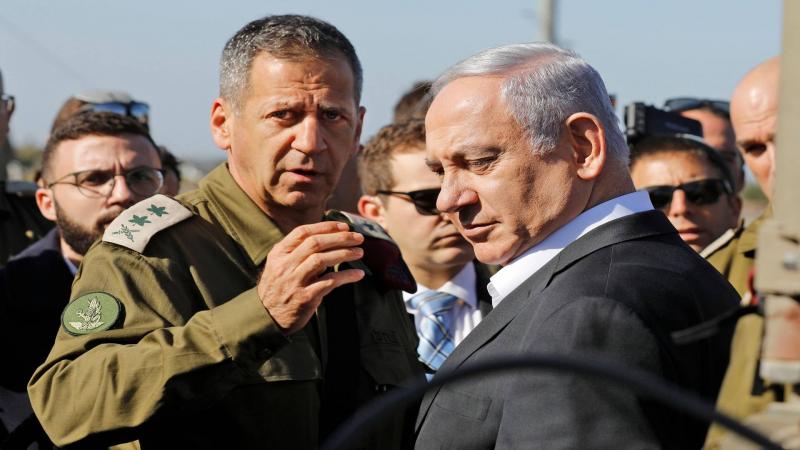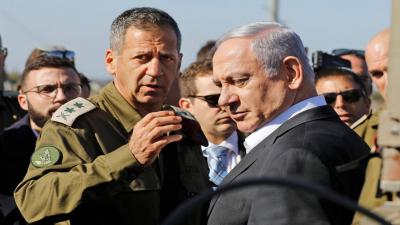The Israeli army stated on Friday that its Chief of Staff Aviv Kochavi will begin a visit to the United States on Sunday to discuss the Iranian nuclear file and its impact across the region. The delegation will include senior security leaders such as National Security Advisor Meir Ben Shabbat, Mossad Chief Yossi Cohen, and Military Intelligence Chief Tamir Hayman. Kochavi's visit, his first since taking office, comes amid significant tensions between the U.S. and Israel regarding the nuclear file, as President Joe Biden's administration intends to return to the 2015 agreement with Iran, a move strongly opposed by Israeli officials, including Kochavi.
According to the Times of Israel, Kochavi will meet with several senior U.S. defense officials, including Defense Secretary Lloyd Austin, National Security Advisor Jake Sullivan, Chairman of the Joint Chiefs of Staff Mark Milley, Central Command Chief Kenneth McKenzie, and U.S. Special Operations Command Chief Richard Clarke. The statement explained that Kochavi will discuss with his counterparts "current common security challenges, particularly those related to the Iranian nuclear threat, Iran's entrenchment in the Middle East in general and in the northern front in particular, the arming of Lebanese Hezbollah, the consequences of precise missile threats, and building a joint force."
Kochavi will be accompanied by his wife Yael, the Israeli Defense Attaché in the U.S. Major General Yehuda Fox, the head of the Israeli army’s strategic and Iranian-focused directorates, and the head of the Israeli army's foreign relations department General Ivi Dvir.
#### Coordinated Messages
Earlier on Thursday, Kochavi, National Security Advisor Meir Ben Shabbat, Mossad Chief Yossi Cohen, and Military Intelligence Chief Tamir Hayman met with Prime Minister Benjamin Netanyahu and Defense Minister Benny Gantz to coordinate their messages to their American counterparts. An Israeli official told Axios that Israeli officials concluded at the end of the meeting that "returning to the agreement would put Israel at risk." Netanyahu emphasized that Israel "is not a party to the nuclear agreement and therefore is not bound by it in any way," adding that Israel "will act only according to its national security interests but will maintain its freedom to act against Iran in the region."
According to Israeli officials, Netanyahu, Gantz, and Ashkenazi stated that Israel "would be willing to discuss the criteria for a longer and stronger nuclear agreement in the future if the U.S. and other world powers decide to go in that direction."
#### Israeli Concerns
Israel feels "concerned" about the U.S. haste in returning to the 2015 agreement, officially known as the Joint Comprehensive Plan of Action (JCPOA), and ignoring its concerns, as Israeli sources told Axios that the Americans responded that Israel "is not adequately responding to the administration's request not to raise surprises regarding Iranian policy." Earlier this week, Israeli broadcaster Kan reported that Israel "has been pressing the U.S. for improved international oversight of Iran's nuclear program, after concluding that there would not be significant changes in the treaty, but nevertheless seeks to slightly improve the terms of the agreement currently being negotiated in Vienna, where Europeans acted as mediators between Washington and Tehran."
Israel and the U.S. formed a strategic group led by National Security Advisor Jake Sullivan and his Israeli counterpart Ben Shabbat, which last met on the 13th of this month, to coordinate their efforts to prevent Iran from acquiring nuclear weapons.
#### Reversible Moves
U.S. Central Command Chief General Kenneth McKenzie stated on Thursday that Iran has not undertaken any irreversible activities in its nuclear program, amid reports of Iran reducing the number of centrifuges for uranium enrichment at its Natanz facility. This statement follows a report from the International Atomic Energy Agency (IAEA) that Iran had decreased the number of centrifuges at its above-ground Natanz facility for enriching uranium to 60%, cutting it down to one group of two previously.
Iranian President Hassan Rouhani mentioned on Tuesday that 60% to 70% of the issues in the Vienna talks have been resolved, while Ned Price, spokesman for the U.S. State Department, indicated that Washington "is backing away from a prerequisite for its return to the deal."
Sullivan told Fox News on Sunday that the Vienna talks with Iran have been "constructive" and that there is a genuine effort to return to mutual compliance with the 2015 nuclear agreement. He added that the U.S. will not lift sanctions unless it has "clarity and confidence" that Iran will fully return to compliance with all its obligations under the 2015 agreement. Negotiators in Vienna are working on the steps both sides need to take regarding sanctions and nuclear activities to return to full compliance, although the talks have become more complicated after an explosion occurred at Iran's main uranium enrichment facility in Natanz.
#### Sunset Clauses
Critics oppose what are known as "sunset clauses" in the agreement, which prevent Iran from undertaking certain nuclear activities but expire after specific years. While the agreement technically prohibits Iran from developing a nuclear weapon, critics point out that these clauses "would allow Iran to do so without punishment once the imposed sanctions end." Supporters of the agreement argue that even if the deal is not perfect, it is the best that can be achieved under the circumstances, as it at least delays Iran's development of a nuclear weapon.




